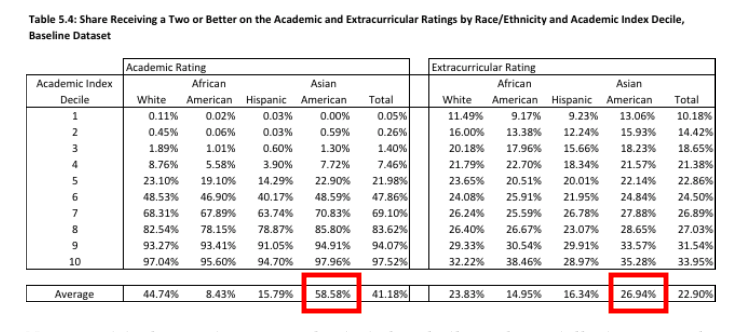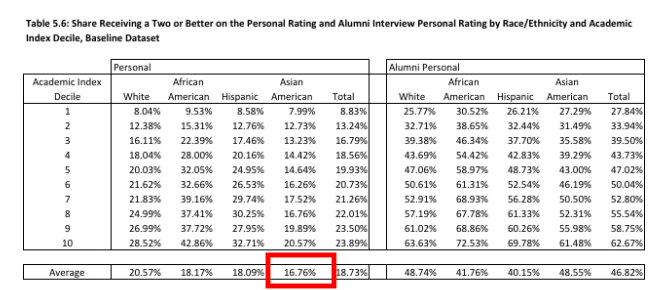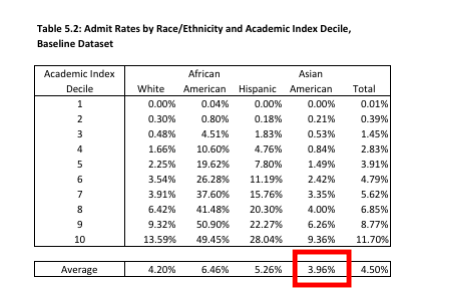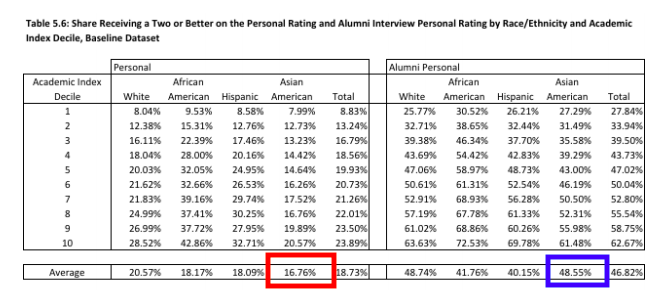The Asian American Discrimination that No One is Talking About
If we’re going to talk about Asian American discrimination, we need to talk about college admissions
Introduction
The Asian American experience is having its moment in the spotlight. I’m personally encouraged by the increased attention towards a group that usually suffers in silence and is often overlooked in conversations about racial justice. But while there are several important conversations happening, I can’t help but notice one glaring omission from the conversation: college admissions.
This a touchy subject. But for many of the hundreds of thousands of Asian high schoolers who apply for colleges every year, it’s part of their lived experience. There’s an unspoken understanding that if you’re Asian American the odds are stacked against you. Rather than rely on anecdotal evidence, I decided to dig a little deeper into the evidence.
It turns out that it is really difficult to get concrete numbers on internal admissions statistics because most universities aren’t transparent. This may explain why a lot of the claims of Asian discrimination come from observations of student demographics over time (e.g UC schools seeing a spike of Asian Americans after California banned affirmative action, Ivy League schools maintaining relatively constant Asian American population despite the general Asian population increasing).
But occasionally, universities will hand over detailed admissions data for lawsuits. One of the most notable examples is Students for Fair Admissions v. Harvard, a lawsuit claiming that Harvard discriminates against Asian American undergraduate applicants. Initially filed in 2014, the case received a ruling in favor of Harvard in 2019, but is now awaiting an appeal to bring the case to the Supreme Court.
For this case, Dr. Peter Arcidiacono, an economist and professor at Duke University, was able to analyze Harvard’s internal admissions data from 2000 to 2019 and prepare an expert report summarizing his findings. His conclusion:
Asian American applicants receive the highest ratings on academics, and extracurriculars, but receive the lowest ratings on the “personal” score, making them the least likely racial group to gain admittance to Harvard.
The Evidence
A few tables from Arcidiacono’s report that support his conclusion, with red boxes added by me. The dataset includes first year applicants from 2014-2019, excluding groups with preferential treatment (athletes, legacy, children of donors).
-
Asian Americans receive the highest ratings on academics and extracurriculars of any racial group

-
Asian Americans receive the lowest “personal” ratings of any racial group

-
Asian Americans have the lowest admit rate of any racial group

What the heck is this “personal” rating?
While academic and extracurricular ratings can be understood objectively, it’s not obvious how what a “personal” rating measures.
Harvard’s filing describes it as a score of candidates' “humor, sensitivity, grit, leadership, integrity, helpfulness, courage, kindness and many other qualities.” These are all great qualities, and I’m sure Harvard has clear guidance to help admissions officers to remain objective as possible, right?
From Arcidiacono’s report:
While the guidelines provide detailed instructions for the various other ratings, for the personal rating, the guidelines list only the following: “1. Outstanding. 2. Very strong. 3. Generally positive. 4. Bland or somewhat negative or immature. 5. Questionable personal qualities. 6. Worrisome personal qualities.”
Ok, maybe not.
Then what does this mean? Is there an explanation for Asian American’s lower overall personal score that doesn’t strongly point to unfair discrimination?
Short answer: No, I don’t think so.
Possible explanations for Asian American’s receiving lower “personal” ratings
Let’s explore some of the possible explanations.
1. Asian American applicants genuinely have worse personal skills across the board compared to other races.
As distasteful as this sounds, for the sake of argument we should address this possibility. Thankfully we don’t have to dig too deep to refute it.
Alumni interviewers, who unlike the admission office reviewers actually meet applicants in person, gave Asian applicants some of the highest personal scores of any racial group.

Despite receiving lowest personal ratings from admissions officers (red box), Asian Americans receive among the highest personal ratings from Alumni interviews (blue box)
This figure also shows that Asians receive the lowest personal score in every single academic decile. This dispels the idea that lower personal scores received by Asians are correlated with their higher academic achievement and pre-occupation with grades.
Harvard admissions officers themselves dispute this claim. From Arcidiacono’s report:
The testimony from officers and leaders of the Admissions Office is that there is nothing about Asian Americans as a group that would suggest they have less attractive personal qualities.
2. Reviewers have a negative bias towards Asian applicants
This is certainly possible, but unless on average the admission office is more biased than the alumni interviewers, then I wouldn’t expect a discrepancy in the personal score between them.
I could imagine that reviewing an Asian applicant as a piece of paper rather than as a person can make reviewers prone to negatively weigh their personality: “Oh, just another Asian, perfect SAT, wants to be a doctor…"
If true, this would be unfair discrimination by Harvard’s admission office that needs to be addressed. But I still don’t think this is the most likely explanation.
3. Reviewers consciously use personal score as a way to manipulate admission pool
This is probably what’s happening.
If I wanted to shape the racial makeup of my student population, but I’m not allowed to set explicit racial quotas, then having a hand-wavy “personal” score would be the perfect tool for the job. It seems likely that the “personal” score is used as a correction factor to obtain the desired demographics in the admitted class - and for Asians American’s this means it’s used as a penalty.
If Harvard is systematically giving Asian Americans lower personal scores because of their race, this is as close to the definition of racial discrimination as you can get.
But what about Affirmative Action?
Many people who take Harvard’s side are proponents of Affirmative Action and focus on the broader context of their actions. Some don’t even deny that the process is unfair towards Asian Americans. Rather, they argue that it’s justified because it helps increase representation of Black and Hispanics, who have historically experienced more barriers to higher education.
There is a popular narrative that Asians are being used as a wedge by white conservatives to dismantle Affirmative Action policies and help White applicants. But even if you support Affirmative Action policies and put aside the admit rate of other minorities, how do you justify Asian Americans having consistently lower admit rates than White applicants? Which group is more underrepresented? Which group has more history of discrimination?
Not only have Asian Americans been cast out of the “minority” bucket, but they don’t even get to play on the same playing field as the “majority.” It’s hard to imagine how you can support the spirit of Affirmative Action and justify this.
Conclusion
What does a better system look like? Maybe it’s time to demand more transparency from admissions office and enforce more explicit reporting of the use of race in decisions. Or maybe we should get rid of race-conscious admissions altogether and transition to a system focused more on socio-economic criteria. This is a complex issue, and I don’t pretend have the best answers.
What I do know is this: there is compelling evidence that college admissions processes are unfairly discriminating against Asian American applicants, and I think more people should be paying attention to this issue.
References
- Peter S. Arcidiacono, Expert Report of Peter S. Arcidiacono, Students for Fair Admissions, Inc. v. Harvard: link
- https://en.wikipedia.org/wiki/Students_for_Fair_Admissions_v._Harvard
- https://priceonomics.com/post/48794283011/do-elite-colleges-discriminate-against-asians
- https://www.vox.com/2018/3/28/17031460/affirmative-action-asian-discrimination-admissions